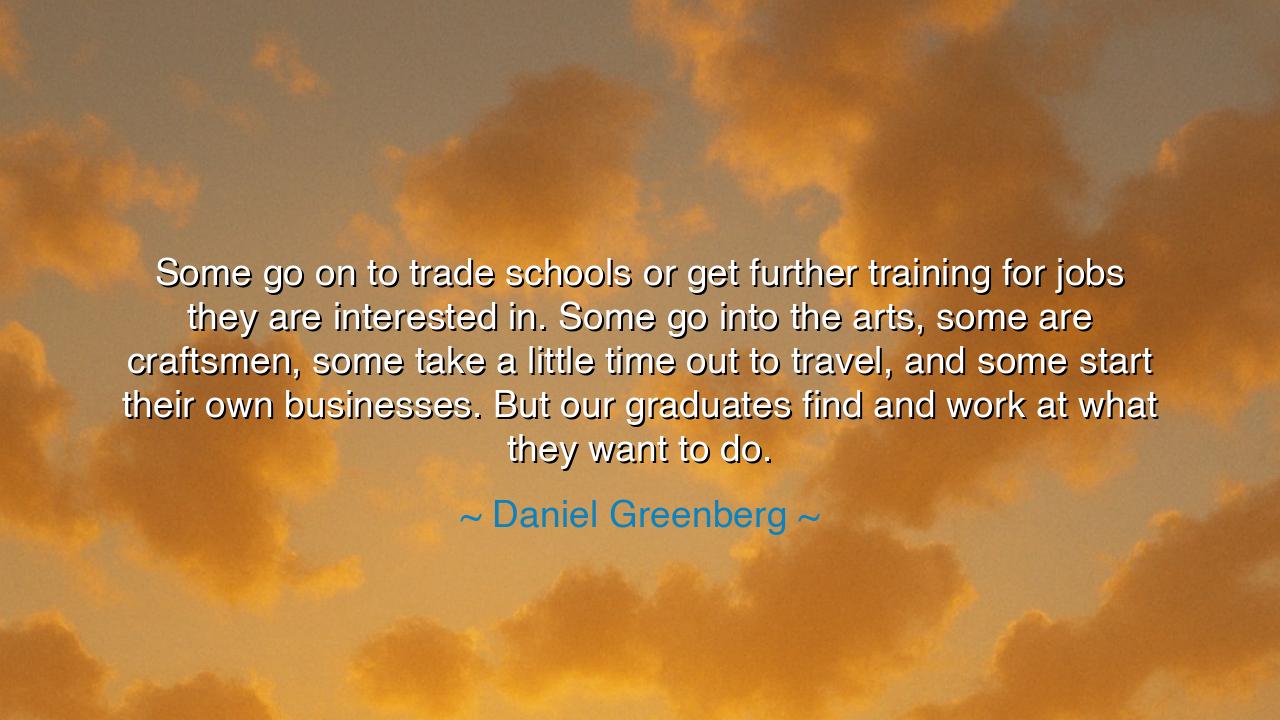
Some go on to trade schools or get further training for jobs they
Some go on to trade schools or get further training for jobs they are interested in. Some go into the arts, some are craftsmen, some take a little time out to travel, and some start their own businesses. But our graduates find and work at what they want to do.






The words of Daniel Greenberg — “Some go on to trade schools or get further training for jobs they are interested in. Some go into the arts, some are craftsmen, some take a little time out to travel, and some start their own businesses. But our graduates find and work at what they want to do.” — speak with a wisdom both modern and eternal. Beneath their simplicity lies a radical affirmation of human freedom: that every soul must find its own calling, and that true education prepares not merely the mind, but the spirit to choose. Greenberg, founder of the Sudbury Valley School, was not merely describing the variety of his students’ paths — he was declaring a philosophy, one as ancient as humanity itself, yet as urgent as the present hour: that the measure of success is not conformity, but purpose.
In his words, we see the unfolding of a great and gentle truth — that life does not demand one road, but offers many. Some become craftsmen, shaping the world with their hands; some enter the arts, expressing the invisible beauty of the soul; some travel, seeking wisdom through experience; some build enterprises, forging order from vision and risk. What binds them is not the uniformity of their path, but the unity of their intent — that each has learned to listen to the inner voice that says, This is mine to do. Greenberg’s message, then, is not about education alone, but about the sacred task of becoming oneself — of aligning one’s life with one’s own truth.
This philosophy reaches back through centuries of thought. The ancient Greeks called it areté — the excellence of fulfilling one’s unique nature. A flute player’s virtue was to play beautifully, a shipbuilder’s to craft sturdily, a philosopher’s to think deeply. In this way, every calling was a form of holiness, for to do what one is meant to do is to honor both the self and the cosmos. So too, in Greenberg’s world, each graduate who follows their own path — whether through art or trade, travel or enterprise — participates in this timeless harmony. His words remind us that society is not strongest when all pursue the same goal, but when each person’s light burns brightly in its own way.
Consider the story of Leonardo da Vinci, who as a youth showed no interest in the rigid paths his contemporaries followed. He apprenticed in art, but soon moved beyond painting into anatomy, engineering, and invention. To his teachers, this seemed scattered; to history, it was genius. Leonardo’s life embodied what Greenberg teaches — that the soul’s curiosity is not disorderly, but divine. When nurtured rather than constrained, it produces a richness of being that no system can design. Education that allows such freedom does not merely instruct — it awakens.
Greenberg’s mention of those who “take a little time out to travel” carries also the wisdom of pause — the recognition that growth does not always come from motion, but from reflection. In the old tales, heroes often leave home not to flee, but to discover. Odysseus, though delayed for years, returned to Ithaca not just wiser but transformed. So too, the traveler who steps into the world unbound by expectation finds within it mirrors of the self. To take time away, to wander, to observe — these are not delays of destiny, but the refinements of purpose. Greenberg’s philosophy honors this rhythm: that life must be lived, not rushed, and that wisdom comes not only from study, but from living fully in one’s own time.
At the heart of his words lies a profound respect for autonomy. “Our graduates,” he says, “find and work at what they want to do.” There is no prescription, no hierarchy, no judgment of paths — only the conviction that freedom, guided by responsibility, leads to fulfillment. This is a rare and noble view in a world that often confuses success with status, or fulfillment with wealth. Greenberg understood what the ancients did: that the good life is not measured by what one achieves, but by how one lives in accord with one’s nature. He trusted that when individuals are allowed to follow their interests, they do not fall into chaos, but into order — the natural order of passion aligned with purpose.
So let this be the lesson to all who listen: honor your calling, whatever form it takes. Do not measure your worth by comparison to another, nor believe that one road is higher than the rest. The artisan’s workshop, the artist’s studio, the traveler’s path, and the entrepreneur’s vision are all sanctuaries of meaning when entered with sincerity. Seek not prestige, but alignment; not applause, but authenticity.
For as Daniel Greenberg teaches, education — and indeed life itself — is not about fitting the mold, but about finding the flame. The greatest gift a teacher can give, and the highest goal a person can attain, is to live freely, responsibly, and joyfully in the pursuit of one’s chosen work. In that pursuit lies dignity. In that freedom lies harmony. And in that harmony, the individual becomes whole — not by imitating others, but by fulfilling the ancient command written upon every human soul: to become what you truly are.






AAdministratorAdministrator
Welcome, honored guests. Please leave a comment, we will respond soon